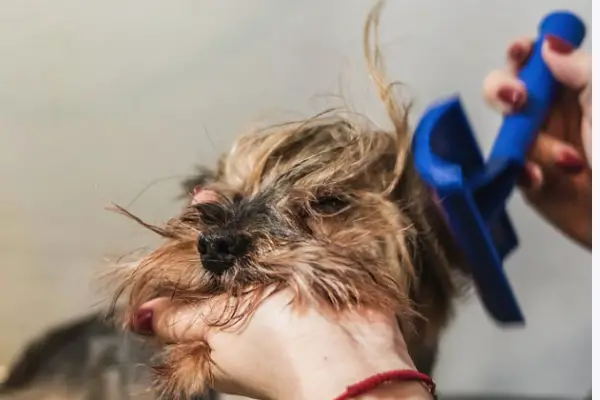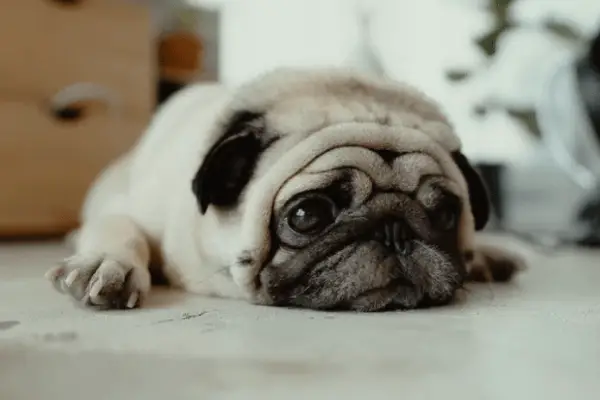Yorkie Shedding: 8 Causes Of Shedding & Control Tips

I hear people saying that Yorkies don’t shed that’s not true, so let’s discuss Yorkie shedding because every dog that has hair or fur does shed.
What makes Yorkies stand out is the level of shedding and how often you notice their long human-like hair in your home.
In this post, I will discuss some reasons your Yorkie may shed more than usual and also highlight ways to control shedding in Yorkies.
I will keep things as simple as they can get… So keep reading!
Do Yorkies shed a lot?
Yorkies don’t shed much because they lack undercoats, however, they do shed hair on little occasions, and their shedding rate is rather modest when compared to other dog breeds.
Because they shed less, their hair is usually hanging in their long coat, creating the impression that they do not shed.
Yorkies tend to shed more than other dogs when grooming due to their thick, long coats, which may be noticed during grooming.
The rate at which a Yorkie sheds hair is affected by a number of factors that we will go over in-depth.
What causes Yorkie shedding
The following are some of the most common causes of excessive shedding in Yorkies to be aware of:
1. Hormonal fluctuations
Hypothyroidism according to Pet Webmd is a hormonal disorder that causes significant hair loss in dogs which can be noticed in dogs who shed less like Yorkies.
It affects Yorkie’s thyroid glands, leading to a deficiency of thyroxine, a hormone that regulates metabolism.
This condition causes hair loss, a dull and thin coat, discolored skin patches, fatigue, a lack of enthusiasm for exercise, and weight gain.
If your female Yorkie isn’t spayed, her heat cycles may affect how much fur she loses at any particular time.
You could see her shedding more hair at the end of her cycles, this may also go unnoticed because they have long hair.
Hair loss induced by hormone fluctuations covers all of these causes of hair loss in Yorkies because it appears to increase the level of shedding for a short time.
Hair loss can also be an indication of pregnancy. Her hormones will return to normal once she gives birth, as will her hair cycle.
2. Skin issues
Skin diseases, bacterial infections, fungal infections, and infestations can all cause hair loss in Yorkies.
These health problems are commonly unpleasant and can lead to hormonal imbalances, which can result in hair loss.
Bacterial infections such as salmonella can be caught by the consumption of raw foods such as raw chicken.
The problem is caused by a fungal infection, which can happen if your Yorkie comes into contact with mold or other types of fungus.
Snacks and dried meals that are not properly stored after each using them may get moldy.
Keep in mind that Yorkies are curious dogs that will sniff out whatever they can find in the gaps of your home.
When out for a stroll, make sure the places where your Yorkie spends time are mold-free and that he does not swallow spores from the ground.
3. Unbalanced or poor diet
An imbalanced diet will cause a Yorkie to lose a lot of hair. Malnutrition or an unbalanced diet also affects Yorkies in the same manner that it affects people.
Hair loss in Yorkies can be caused by a dietary imbalance. As a result, be careful what you feed your Yorkie.
If you detect any unusually heavy shedding after changing your puppy’s diet, switch back or consult a veterinarian, whether it’s winter or spring.
Balanced dog food contains the minerals and vitamins required to maintain healthy skin, strong hair follicles, and minimal discharges.
Because omega-3 fatty acids have been demonstrated to assist in the formation of healthy hair in Yorkies, including them in their diet is always a good idea.
Yorkies require a wet diet since dry skin or dehydration can result in undesired hair loss.
4. Allergies
Yorkie skin may get inflamed and shed because of sensitivity to specific foods or pollutants in the environment.
As a result of the allergy, your Yorkie may scratch, lick, or bite himself, producing substantial hair loss.
Allergies in Yorkies can be triggered by a variety of factors, including food, dust, medication, and insect bites.
Yorkies’ hair falls out as a result of an allergic response on their skin when they come into touch with anything they are sensitive to.
This is an uncommon type of shedding that only happens once in a while. If you find any allergy triggers, keep them out of reach of your Yorkie.
5. Anxiety and excessive stress
Yorkies, like other dogs, lose their hair when they are stressed or when they suffer anxiety.
Keep in mind that changing daily routines or mealtimes might be stressful for Yorkies.
Hormonal variations might induce excessive or infrequent shedding in overworked Yorkies.
When you go home from work, for example, you realize that you have hair all over your body.
As a result, separation anxiety, depression, and other unpleasant emotions in Yorkies are intricately tied to canine hair loss caused by stress.
Because you can’t totally prevent Yorkies from shedding, we’ll look at a few typical shedding management options.
What causes stress for Yorkies?
Here are some common activities that cause stress, depression, or anxiety for Yorkies:
- A new addition to the family.
- Another animal friend.
- There isn’t enough mental stimulation.
- Relocating to a new home.
- You’re always shifting things around in your house.
- Loneliness.
- Sounds that are very loud, such as gunshots.
- Having a suffocating atmosphere.
- Your daily routine is always changing.
- Changing your dog’s food on a regular basis.
6. Parasite attacks
Yorkies who go outside can get fleas, mites, worms, and lice, but they shed a lot as a result of the infection.
If not properly cared for, a single bite from one of these pests can cause a range of issues, including excessive shedding.
Bug bites annoy Yorkies, and this bite may result in shedding, despite the tiny quantity of shedding.
If your Yorkie has a parasite, she will continue to shed it until it is no longer present.
As a result, the dog may get irritable and itchy, and bald patches may appear in certain situations.
Flea bites can cause severe allergic reactions and extensive shedding in your Yorkie, so keep him away from them.
7. Medications
If you give your Yorkie medications and it immediately begins shedding, the medication’s adverse effects might be contributing to the excessive shedding.
Certain drugs, on the other hand, may cause your Yorkie to scratch excessively and shed excessively as a result of irritation or scaling.
Your Yorkie may over-groom herself as a result of certain disorders, resulting in baldness.
At any point, if your Yorkie is shedding excessively, you should have him checked out to rule out any health issues.
Consult your veterinarian to discover if any of your Yorkie’s medications are contributing to her excessive shedding.
8. Health issues
If your Yorkie is unwell, you’ll notice that his or her hair is falling out in clumps more than anything else.
The pattern changes when your Yorkie sheds appropriately. This type of hair loss does not occur in clumps.
However, it’s critical to be aware of this since you may immediately treat your Yorkie to help him feel better.
Hair loss in Yorkies can be caused by or worsened by a variety of factors.
The following are some of the most common health problems in Yorkies that are associated with hair loss:
- Hypothyroidism
- Kidney disease
- Cancer
- Bacterial infections
- Liver conditions
Ways to control shedding in Yorkies
The following are some of the most frequent methods for controlling or preventing excessive shedding in Yorkies:
1. Keep your Yorkie hydrated
Make sure your Yorkie has access to clean drinking water at all times to avoid dry skin and lower body temperature.
This is important because dogs that don’t drink enough water have dry skin and hair, which contributes to excessive shedding.
If your dog’s water dish is maintained clean and full, the risk of harmful bacteria being consumed is decreased.
Keep an eye on your dog’s water bowls to ensure that they are only drinking clean water.
Not only may dehydration create health issues, but it can also induce shedding. As a result, make sure your Yorkie dog has access to fresh water at all times.
2. Brushing your Yorkie regularly
Brushing your Yorkie on a regular basis is one of the most effective ways to remove stray fur from his coat and avoid excessive shedding.
Before using a bristle brush, try using deshedding products (such as furminators) and other grooming gear developed particularly for double-coated puppies, such as grooming gloves or mittens.
Brushing once a week should suffice in most cases, but some Yorkies may require daily brushing to keep their shedding in check. Along the process, it’s also a good idea to reward them with sweets.
Brush your Yorkie outside, and keep in mind that your dog may shed dead hair at any time. For your own sanity, limit your brushing time to fifteen minutes.
3. Offer high-quality dog food
Keep a close eye on what your Yorkie eats. In all dogs, a well-balanced diet promotes healthy skin and decreases shedding.
A Yorkie’s food should be nutritious and well-balanced. How well you feed your Yorkie will impact the quality of its coat.
To keep even the slightest hair loss on the inside to a minimum, feed your Yorkie a well-balanced diet.
If your Yorkie consumes dog food high in Omega-3 fatty acids, oils, and minerals, her hair and skin will be as smooth and healthy as possible.
Consult your veterinarian before making any changes to your Yorkie’s food.
4. Bathing your Yorkie
Bathing your Yorkie keeps its skin clean and decreases its temperature, both of which are important for shedding.
Your veterinarian may suggest a shampoo for your Yorkie, and you should follow the directions carefully.
Following a bath, thoroughly dry your Yorkie’s skin; leaving your dog’s skin to dry naturally will result in skin issues.
Allowing your Yorkie’s skin to become damp might lead to parasite invasion.
5. Avoid allergies
Eliminating allergies is one of the most critical things you can do to protect your Yorkie from shedding excessively.
Yorkies can be allergic to pollen, mold spores, dust mites, and dead skin cells, to name a few allergens.
Keep a watch on your dog’s skin and hair for rashes or hair loss that might suggest a food allergy.
Some of the most common indicators that your Yorkie is allergic to various foods or materials are as follows:
- Vomits repeatedly
- Running eyes
- Frequently licking
- Typical diarrhea
- Swelling of the face
- Itchy ears
- Consistent sneezing
- Running nose.
6. Avoid parasite infestations
Fleas, ticks, and other parasites can irritate your Yorkie while also lowering the quality of its coat.
If flea bites are not treated consistently and effectively, they can cause significant hair loss as well as itchy, irritated skin in Yorkies.
Make an appointment with your veterinarian to talk about flea and tick prevention.
Worms and other parasites can infect your Yorkie in a number of ways, including the ones listed below:
- In Yorkies, ingesting fleas by accident can result in worms.
- Mosquitoes can infect dogs with heartworms, so keep them away.
- Your Yorkie may become worm-infected when pursuing a worm-infected rat in your backyard.
- Yorkies may acquire worm-infected by eating worm larvae.
- Yorkies have been seen consuming worm larvae from abandoned houseplants.
- Yorkie can catch worms from your overgrown and neglected flower beds in the backyard.

![Dog Not Eating While Owners On Vacation [7 Reasons & Fix] Dog Not Eating While Owners On Vacation](https://petcreeks.com/wp-content/uploads/2023/02/Dog-Not-Eating-While-Owners-On-Vacation-768x555.jpg)
![Do French Bulldogs Shed A Lot [9 Shedding Causes] Do French Bulldogs Shed A Lot](https://petcreeks.com/wp-content/uploads/2021/07/Do-French-Bulldogs-Shed-A-Lot-768x644.jpg)



![How to Trim Dog Nails [A Step-by-Step Guide] How to Trim Dog Nails](https://petcreeks.com/wp-content/uploads/2023/09/Copy-of-Copy-of-Copy-of-Copy-of-Copy-of-Copy-of-Untitled-Design_20230924_164757_0000-768x555.jpg)